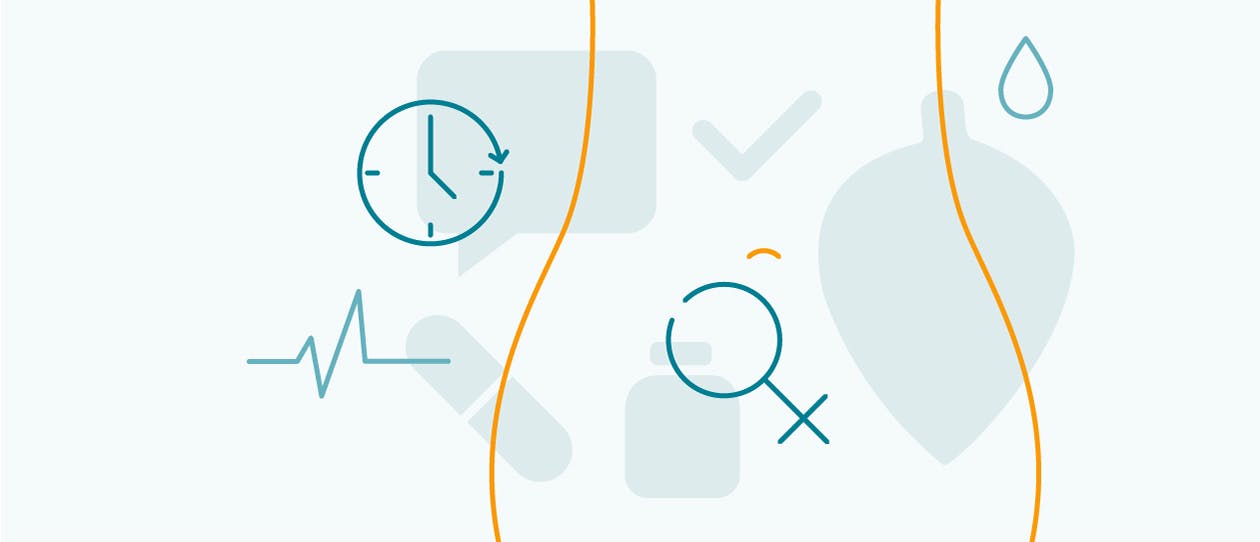
- Health hub/
- Women's health/
- Menopause


Menopause usually occurs at 45-55 years of age, but can also occur earlier or later . Some women experience symptoms such as:
- Changes in the frequency, duration or flow of the menstrual periods, until they eventually cease.
- Hot flushes, which usually begin on the head and face and radiate to other parts of the body, sometimes causing red blotches on the skin.
- Night sweats.
- Insomnia (which may contribute to irritability and fatigue).
- Mood swings, increased nervousness or tension, anxiety, irritability, depressed moods.
- Poor concentration and memory.
- Reduction of sexual drive.
- Changes to the vagina and vulva (including vaginal dryness), facial and scalp hair, and skin texture.
- Decreased bladder tone, which may lead to stress incontinence.
- Reduced muscle strength and tone.
- Weight gain.
In addition, women have an increased risk of developing osteoporosis and heart disease from menopause onwards.
The date of menopause is considered to be the date of the last period, and a woman is said to have gone through menopause when her last period was at least 12 months before.
Menopause results from a natural process in which a woman stops ovulating, her ovaries stop producing oestrogen and progesterone, and menstruation ceases. Removal of the ovaries can also trigger menopause, which in this case is sometimes referred to as surgical menopause.
Other factors that may cause or contribute to early menopause include:
- Smoking
- Never having been pregnant
- Depression
- Exposure to pesticides and other toxic chemicals
- Some forms of treatment for childhood cancer
- Autoimmune diseases (e.g. lupus)
- Genetic factors
Oestrogen has a range of effects in the female body, including helping to maintain cardiovascular health, bone density and the moisture levels of the skin. After menopause, the decline in oestrogen means that a woman’s risk of heart disease and osteoporosis increase.
- Phytoestrogens are plant substances that have an oestrogen-like action in the body and can supplement the effects of the body’s declining oestrogen levels. For example, the isoflavones found in soy products may help to reduce the severity and frequency of menopausal symptoms such as hot flushes and night sweats. Soy isoflavones may also help decrease loss of bone density in peri-menopausal and post-menopausal women and consequently may help reduce the risk of fractures
- Phytoestrogens are plant compounds that are similar in structure to human oestrogens. Eating a diet rich in phytoestrogens may help to reduce menopausal symptoms. Soy products (such as soy beans and tofu) and flax seeds (also known as linseeds) are any easy way to incorporate phytoestrogens into your diet.
- To help maintain cardiovascular health, reduce the quantity of cholesterol and saturated fats in your diet. This involves avoiding animal fats (meat and full-fat dairy products) and sources of hidden fat such as pastries and pies. At the same time, increase the amount of fish in your diet (but not deep fried fish), and eat more fruit, vegetables and whole grains. Include moderate amounts of monounsaturated fats in your diet too, such as those in nuts (especially walnuts), seeds and olive oil.
- If you’re experiencing hot flushes, avoiding hot drinks and spicy foods may help to minimise their impact. It may also be helpful to wear loose clothing, made from quick-drying fabrics.
- If you are experiencing emotional issues or mood problems, take steps to avoid and minimise stress, perhaps by learning relaxation techniques such as meditation.
- Disturbed sleep may benefit from the avoidance of caffeine, and by exercising during the day.
- If you’re experiencing vaginal dryness, a vaginal lubricant can help to minimise discomfort. Remaining sexually active may also promote vaginal health during this time.
- Stop smoking
- Calcium consumption becomes even more important after menopause. Unless you’re allergic to milk or lactose, try to include several serves of low fat dairy foods in your diet every day. Other important sources of calcium include tinned salmon and sardines (eat the soft bones, which are rich in calcium), soy milk that has been fortified with extra calcium, broccoli , beans and almonds. Reduce calcium losses by avoiding excessive amounts of animal proteins, alcohol, caffeine, soft drink and salt. Support calcium absorption by avoiding foods high in oxalic acid (e.g. beetroot and beet leaves, spinach and silver beet, rhubarb, and tea) and phytates (e.g. bran).
- Make sure you expose around 15% of your body (for example your hands, face and arms) to the sun 6 times per week for 6-8 minutes in order to obtain vitamin D. Older women should expose themselves to sunlight more frequently (5-6 times a week), and women with dark skin should expose themselves for a longer period of around 15 minutes. Early morning or late afternoon sunlight is best; avoid sun exposure during the heat of the day, when sun-related skin damage is most likely to occur.
- Regular exercise has numerous benefits, helping to maintain cardiovascular and bone health, a healthy body weight, healthy moods and self-esteem. Exercise also helps maintain muscle strength, coordination and balance. Weight bearing exercise (e.g. jogging or walking) and strength training (e.g. resistance exercise such as weight lifting) are the most important types of exercise for the prevention of osteoporosis, and ideally your exercise regime should incorporate both forms of activity. However some forms of exercise may be inappropriate for you - ask your healthcare professional for advice.
Eat more soy foods or take a phytoestrogen supplement made from soy to ease your transition through menopause.
Calcium storage in the bones takes place over the course of your whole life - its never too early to start regular weight bearing exercise and calcium supplementation.
- If you are experiencing heavy bleeding, frequent periods, spotting, or bleeding after intercourse, consult your doctor, who can arrange for the necessary tests to rule out causes other than approaching menopause.
- If you are experiencing symptoms related to menopause and you are under 40 years old, consult your health care professional.
- If you experience vaginal bleeding after the perimenopause, that is, more than 12 months after your last period, seek medical advice.




